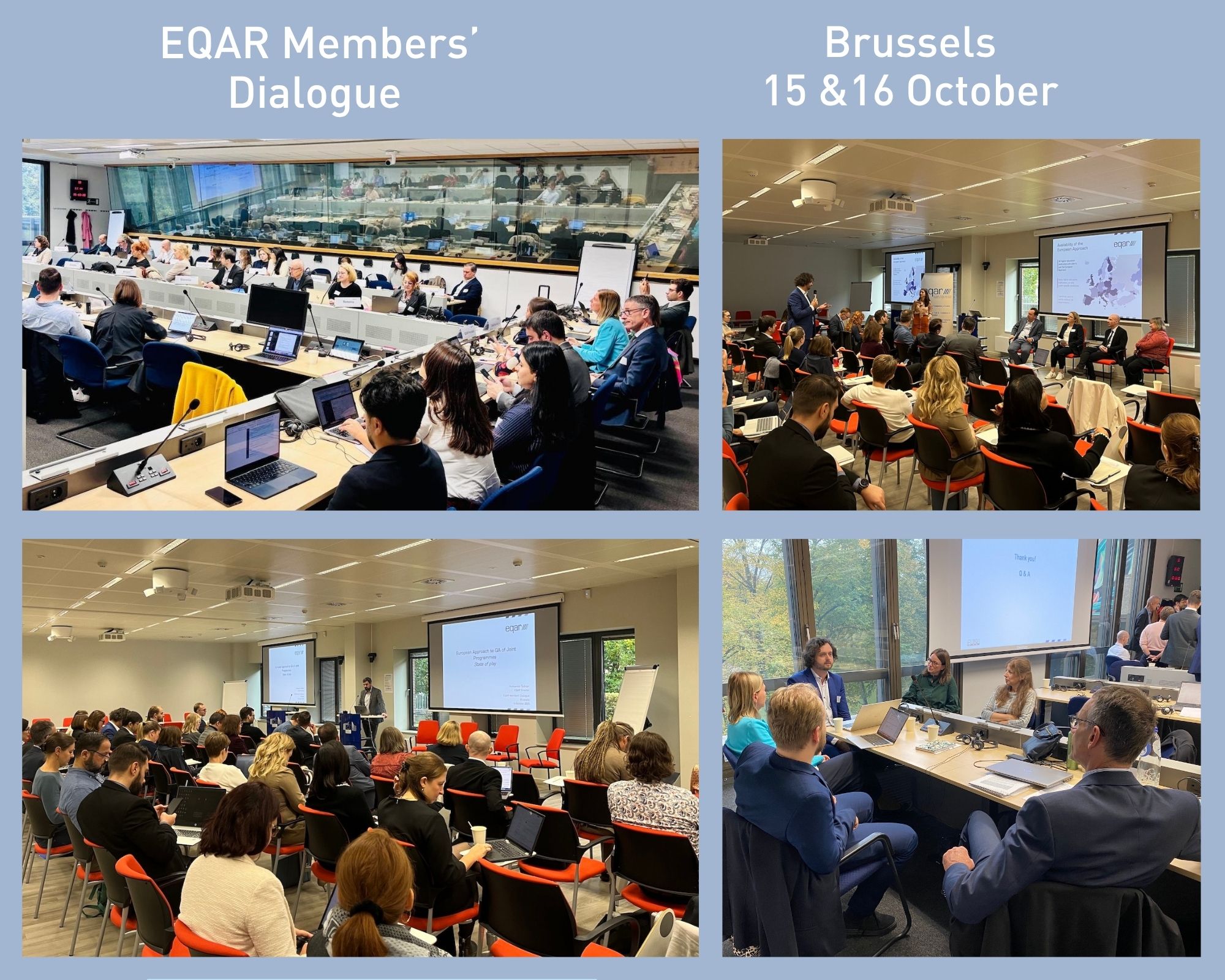
EQAR Members’ Dialogue in Brussels
The 15th edition of the EQAR Members’ Dialogue (MD) took place in Brussels on 15 and 16 October. We were delighted to see and interact with our members in person, to converse and exchanges views on HE topics relevant for EQAR and our stakeholders.
Programme
The MD’s programme featured a diverse range of subjects such as the ESG revision, the European Approach for Quality Assurance of Joint Programmes, micro-credentials and other HE developments. The informal atmosphere of the event facilitates exchange and networking among governments and stakeholders. Check out the programme and presentations here.
The MD was preceded by the Extraordinary General Assembly and both events were generously hosted by DG EAC, on the first day in “Centre Borschette” and on the second day in “Mero” on Avenue Tervuren.
Attendance
The Members’ Dialogue was well attended, with 63 participants in total, including all founding members, one social partner and 28 governmental members. The EQAR Register Committee and Appeals Committee were also represented at the event.
Topics
Topics of the first part of the day centered mainly around the ESG revision, including a presentation on behalf of the ESG steering committee, a workshop lead by steering committee members, followed by a special session on ESG standard 3.3 about the independence of QA agencies, presented by Aleksandar Šušnjar.
Update of the EQAR Knowledge Base
With the start of the SIQA project, one of the project tasks for EQAR is to “Provide an evidence base for the state of play of system-level factors and legislative frameworks for external QA by updating and enhancing the EQAR Knowledge Base”.
The first step in this process will be a “user needs analysis” which will be open to EQAR members but also to the public. The analysis will question the usage of the Knowledge Base so far, ask for a rating of the various elements as well as of the level of usefulness of the potential expansion, and end with open-ended questions for providing further ideas. A first glimpse of potential changes and questions for the “user needs analysis” was shown at the MD, presented by Blazhe Todorovski.
Knowledge Café
The first day concluded with the Knowledge Café format, in which a wide variety of subjects were presented in small groups, thus enabling informal and spontaneous discussions. During the knowledge Café there were two interesting country examples, the first one by Slovakia where regulatory changes have impacted the QA framework and where the QA system now also reflects the needs of the labour market. The second example came from Slovenia. Their education system offers micro credentials, in their case short courses of one to nine ECTS, that develop specific personal, social, and labour market skills. These courses are delivered by higher education institutions and undergo evaluation by the Slovenian Quality Assurance Agency as part of institutional re-accreditation.
The second day started with three parallel sessions and continued with a more in-depth look at the European Approach for QA of Joint Programmes (and beyond) as well as a panel discussion on the European Approach in practice.
Some sound-bites of our event to reflect upon:
- The ESG revision is soon moving to the phase of public consultations where everyone will be invited to provide feedback on the first draft of the revision. The key question to address will be how to make the ESG up to date with the major trends and developments in European higher education without situating it too much in the current moment in time.
- To quote ESG standard 3.3. on Independence: “Autonomous institutions need independent agencies as counterparts”. Going forward it will be crucial to analyse in more detail and address existing threats to the agency’s independence, but also to monitor and prevent potential decline in systems which currently appropriately safeguard this independence.
- The European Approach celebrates its 10th birthday this year! To move out of childhood into adulthood it will be necessary to address insufficient implementation of the European Approach in national regulations (at this point in time, only 21 out of 47 EHEA countries fully implement it), but also to guard against misimplementation in order to truly remove barriers to delivery of joint programmes that stem from accreditation frameworks.
- The new Council Recommendation commits to supporting the further development of DEQAR and encouraging publication of quality assurance reports in DEQAR, with the aim of facilitating recognition processes across Europe. When it comes to the European degree, it is foreseen that EQAR-registered agencies will be able to award this label to joint programmes.
We thank our members and speakers for their valuable input and look forward to next year’s MD!